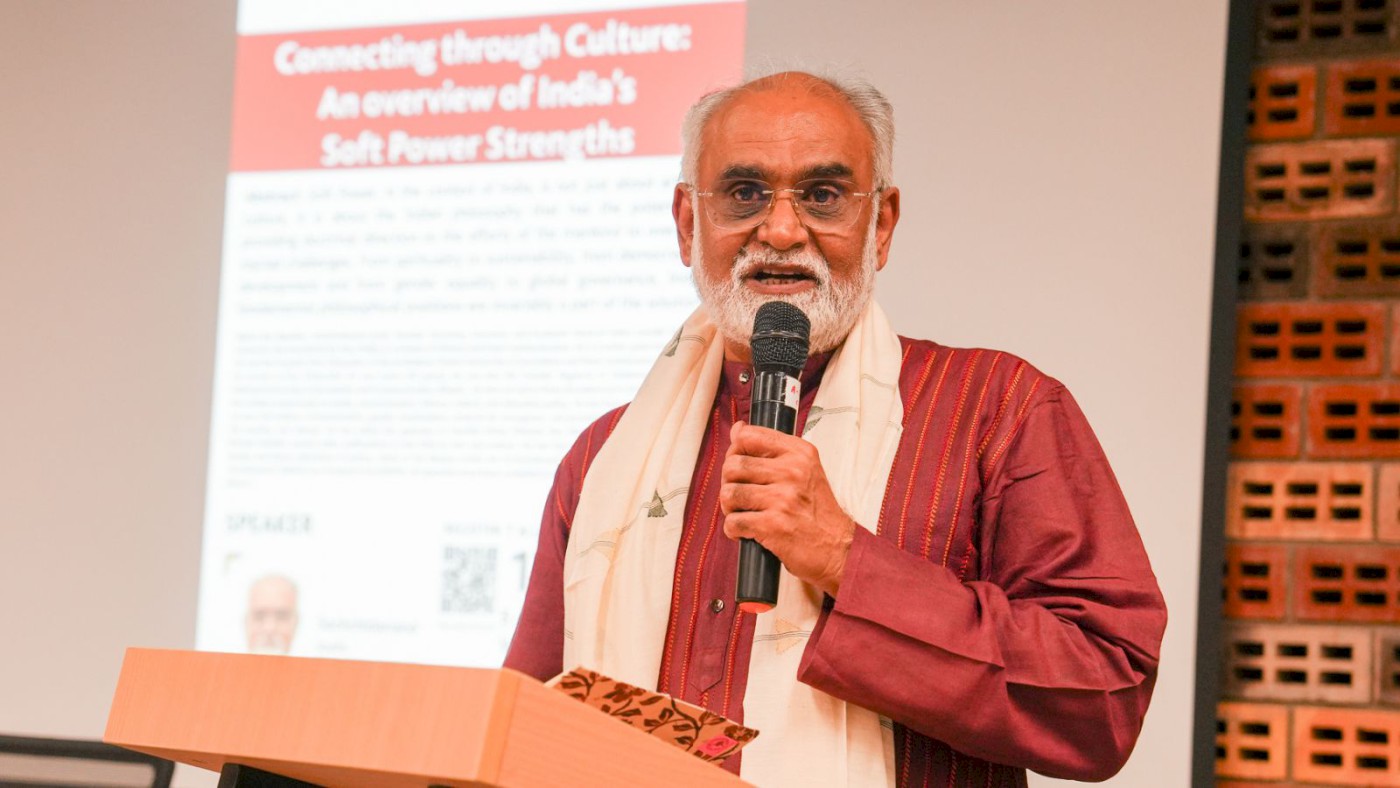
When Indians share their origins in interactions with others in a foreign land, the initial reaction they receive is rarely one of recognition of their country as a great military, scientific, or economic power. Instead, they are identified as belonging to a land of great culture, noted Sachchidanand Joshi, Executive Academic Head of the Indira Gandhi National Centre for the Arts, during his recent talk on the strength of Indian culture as soft power at Ahmedabad University. Joshi emphasised that in the eyes of the entire world, India's true identity lies in its cultural heritage, which is literally a binding force for the entire world.
Quoting Will Durant, the American historian and philosopher, Joshi pointed out that the Western civilisation acknowledges India as the motherland of the human race and the birthplace of the Sanskrit language, which has influenced many European languages. India was a thriving epicentre of philosophy, mathematics, and science; the fountainhead of ideals embodied in various religions practised here; and the genesis of the values of self-governance and democracy represented by its village communities. This affirms that Mother India is literally a mother figure for us in many ways. Durant expressed these sentiments long before the term ‘Indian knowledge tradition’ gained popularity. This narrative illustrates the role played by India's historical legacy on the global stage. Let us explore Sachchidanand Joshi's perspective on what constitutes soft power and its potential to tackle pressing global challenges.
Culture as Soft Power
Joseph Nye introduced the term ‘soft power’ in the 1980s, which is perceived as a new concept globally. However, an assessment of its meaning and nuances indicates that soft power has always been an intrinsic part of life in India, embedded in the cultural ethos that defines its society. In fact, culture in India is much more than soft power—it is actually strong power.
India is one of the few countries that has never pursued imperialistic ambitions or invaded other nations. Its focus has always been on universal brotherhood, viewing all living organisms, including flora and fauna, as part of one family. This philosophy is encapsulated in the Sanskrit doctrine of 'Vasudhaiva Kutumbakam,' whose literal translation is "the entire world is my family". This contrasts sharply with European constructs that often view man and society as separate entities.
Indian philosophy is rooted in the principle of ‘live and let live’ rather than aligning with the Western ideal of ‘survival of the fittest’. It is this value system of allowing everyone to live as they choose that echoes India's commitment to win hearts rather than territories by resorting to militaristic aggression. This is also why India has always championed the concepts of equality and unity in diversity. These core values have helped India survive and thrive through the ages, allowing it to preserve its cultural ethos. The emergence of the concept of soft power underlines the importance of achieving progress through peace, symbolising India’s potential to unite the world amidst the chaos of wars and conflict.
Leveraging Soft Power to Address Contemporary Challenges
With an archive of more than two crore documents, India holds the world's most extensive collection of manuscripts, surpassing the combined resources of entire Europe. These manuscripts, dating from 400-500 to as far back as 1200-1400 years ago, have been written in traditional languages such as Sanskrit, Pali, and Prakrit, using over 36 different scripts. This diversity and richness of the vast array of its manuscripts indicate India's deep-rooted cultural heritage and knowledge traditions that can be leveraged to address contemporary global issues.
For instance, India's ancient manuscripts include remarkable works like Samrangana Sutradhar, a five-volume text written by Raja Bhoja in the tenth and eleventh centuries, providing extensive knowledge on town and country planning, including detailed instructions on building materials and construction technologies. Further, Indian culture boasts of more than 90 manuscripts on urban planning and architecture, which do not find a place in the syllabi of modern architecture courses. Incorporating this ancient knowledge in contemporary pedagogy could provide sustainable solutions to present-day urban challenges, such as environmental impact and resource management.
Similarly, Indian manuscripts hold useful insights on health and dietary practices. Over 56 such texts focus solely on culinary habits and nutrition, providing an understanding of healthy diets and eating habits that modern dieticians often overlook. If integrated into current health practices, this knowledge could offer natural and holistic approaches to wellness, reducing dependence on costly dietary consultations. Additionally, India's ancient wisdom on health extends to Ayurveda and Yoga, both of which have gained international recognition. The power of Yoga, for example, was evident when people from 193 countries joined in practising it during International Yoga Day on June 21. This worldwide acceptance of the values propagated by it reflects the soft power of Indian culture, emphasising that India's cultural heritage is not just a relic of the past but could become a powerful tool for solving today's global problems.
The world is evolving rapidly, with nations vying against each other for supremacy. In this context, what will set India apart and guide it through this war would be its own narrative, thought, and philosophy. A country with a strong narrative enjoys a certain superiority over others, and India possesses that power, capacity, and potential. It is crucial to leverage the strength of our culture, traditions, and heritage. This is the message that resonates in the collaboration between Ahmedabad University and the IGNCA, wherein integrating heritage management into modern education creates a unique platform to bridge historical knowledge with contemporary challenges. This partnership also aims to foster sensitivity among students, instilling in them the worth of our heritage and culture, going forward.